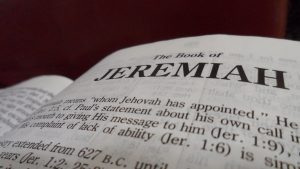
Jeremiah 17:1-10
The nation of Judah had drifted far from God, worshipping idols and ignoring the covenant and the law that God gave Moses on mount Sinai. Their sin was deep rooted, it wasn’t simply a fleeting failure. Jeremiah uses the picture of an engraving tool in verse 1, the sins were indelibly marked in their culture. This has been the condition of man since Adam’s sin in Genesis 3. Sin is not a matter of mere actions, sin is a matter of the heart, and all of us are desperately sinful in our nature.
The Greek definition for sin is to miss the mark, to miss the standard for which we were created. We as human beings, like no other creature, were created in the image of God, and as such we were created to glorify Him by our worship, and our enjoyment of Him forever.
This is the mark we have missed, we worship, money, sex, fame, various forms of entertainment and objects of our own creation just to name a few idols. We are no different to the nation of Judah, we have missed the mark, we are sinners. In verse 3 and 4, God says that because of their sins, he will punish them and give away all their treasures and wealth as plunder to their enemies. Even though God spoke so directly through the prophet Jeremiah, the people ignored the message and treated Jeremiah like the enemy.
The irony is that God tells them that he will enslave them in a land they do not know, but the reality is that they were already slaves. When we are living in willful sin, we are enslaved by that sin. Sin itself is slavery, because we are separated from the joy of knowing the pleasure and the grace of God in our lives.
The Lord continues in verse 5, “This is what the Lord says: “Cursed is the one who trusts in man, who draws strength from mere flesh and whose heart turns away from the Lord.”
Where do you place your trust? Do you trust in your retirement fund? Your paycheck? Your savings? Your inheritance? Perhaps you trust in a person to take care of you? The truth is that no matter what we trust in, if it is not God, the Bible says we are under a curse.
The converse of verses 5 and 6 are verses 7 and 8 said. Verse 7 says, “But blessed is the one who trusts in the Lord, whose confidence is in him.” Do you want to experience God’s blessing? Trust Him!
In verse 8 we read that the person who trusts in the Lord will receive a promised blessing from the Lord, they will have no fear, no worries, and they never fail to bear fruit.
As we look at ourselves, how do we really know if we trust the Lord? We can easily fool our neighbor, our pastor, even our spouse, but God knows our heart (see Jeremiah 17:10).
Just like God knew the hearts of the people of Judah, he knows our hearts today. As a result of their sin, God punished the nation of Judah, the attack from the north came and most of them were taken into captivity. It was a terrible and dark time for the nation. The captivity in Babylon was relatively short, only 70 years, but the nation was destroyed and would never be the same again.
The punishment for sin was severe, and God still punishes sin today, we don’t like to talk about it, but He does, God loves us too much to leave our sins unpunished.
But there is good news, as we look at Jeremiah 31:31-34. This prophecy in Jeremiah 31 talks about a time far in the future for those living in the 6th Century BC, Jeremiah was prophesying about the new covenant, he was pointing to our time, this day and age.
Obviously, we still struggle with sin and the world is in a desperate state because of our rejection of God. Our problem with sin is far worse than we could ever imagine. Our sinful self is so wicked that we don’t even have the desire to know God, let alone want to come near to Him. Our hearts are inscribed with sin, we cannot erase it, it is impossible for us to change our hearts.
But here is the Incredibly Good News, God made a New Covenant with mankind. Jeremiah was prophesying about The Gospel, Jesus, the son of God, coming to earth as a child, living amongst men, and then giving his life as the ultimate and perfect sacrifice in order to save us from our desperately wicked state. We sometimes take the Gospel for granted, we gloss over it every time we celebrate communion together. But this is incredible news in Isaiah 9:2 we read, “The people walking in darkness have seen a great light;”
Of all the 1366 verses in the book of Jeremiah, chapter 31 and verse 33 is the pinnacle of his revelation from God.
Notice the contrast between chapter 17, where our hearts are engraved with sin, and the New Covenant in chapter 31, God promises to write a new law on our hearts. It takes a miracle to remove engraving, we cannot do it, but because of what Jesus did on the cross, by submitting our lives to his glorious gift of salvation, we get new hearts. We get the very presence of the living God living inside of us by the Holy Spirit. This is what Jesus spoke about in Luke 22:20
The Old Covenant was important to reveal to mankind that we are desperately sinful and cannot begin to fulfill the holy requirements of God. But God created us with the capacity and the need for a relationship with Him, not simply to follow a set of blind rules.
This is where the church has missed the point I believe. In our desire to make “good Christians”, we have created rules and structures, and our efforts have resulted in legalism. The truth is that:
Rules without a Relationship is Bondage.
I am not advocating for the erasing of all rules, that is anarchy, but if we are content to follow the rules without a relationship with our Heavenly Father, in a sense we are still living under the Old Covenant.
Are you still living under the Old covenant, trying to be good enough for God? That is impossible, that is why Jesus came to save us, that is why we have the Gospel!

